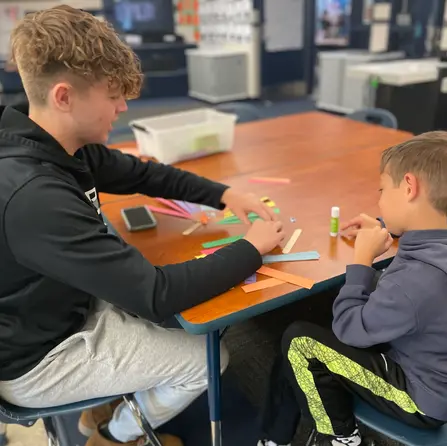Education and Leadership Pathway Courses

ECE214
1 Credit
Students learn concepts and strategies for creating a positive learning environment that meets the academic,
social, and emotional needs of a diverse classroom. Students practice skills for organizing the classroom
effectively, engaging and motivating students, building positive relationships, promoting self-regulation and social-emotional learning (SEL), developing and teaching rules and behavioral expectations, cultivating a growth mind-set, and managing individual and group behaviors. Students develop a trauma-informed and culturally competent personal
classroom management philosophy and comprehensive MTSS and PBS plan. Furthermore, candidates design tools to increase collaboration and communication with families, communities, and administrators. Lastly, candidates analyze their own beliefs, philosophies, and practices as well as self-reflect and plan to promote their well-being while reducing burnout and stress.
04256
1 Credit
In this course, students investigate the scientific theories of human behavior and their application. They explore the anatomy of the brain discovering why people behave the way they do. Students taking this course are expected to take the AP Psychology exam.
191550
1 Credit + 6 College Credits
In this course, students develop a solid and comprehensive understanding of research-based instructional practices through literacy. Specifically, instruction includes a multi-componential instructional focus surrounding the six pillars of the science of reading instruction: Oral Language, Phonemic Awareness, Fluency, Vocabulary, and Comprehension. Teacher candidates will develop an awareness of social and cultural language differences, including language acquisition of young children across cultural and linguistic groups. This course also includes a study of literature for children, ages birth through Grade 2 and is designed to introduce teacher candidates to a wide range of genres including classics and contemporary materials. The course emphasizes the development of knowledge of literature and how to effectively integrate that knowledge into the curriculum. Particular attention is given to diverse representations in children's literature and the importance that diversity and equitable representation in children's literature plays in social and emotional development. In this course, teacher candidates utilize their knowledge of the major components of literacy and learner development to create literacy-rich learning environments with attention to student development, culture and families.
EDU204
1 Credit
This course examines cultural and ethnic differences in values and the implication for classroom instruction and curriculum development. Also included in the examination of current research findings concerning cultural perceptions, practices, and communication styles for teaching cultural and ethnic differences for program planning in classrooms, schools and school districts will be studied.